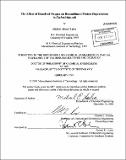The effect of dissolved oxygen on recombinant protein degradation in Escherichia coli
Author(s)
Laska, Michael Edward, 1973-
DownloadFull printable version (15.31Mb)
Other Contributors
Massachusetts Institute of Technology. Dept. of Chemical Engineering.
Advisor
Charles L. Cooney.
Terms of use
Metadata
Show full item recordAbstract
The production of proteins in recombinant host cells has become an invaluable tool to obtain significant amounts of protein for therapeutic and other applications. Efforts to increase expression of foreign proteins in Escherichia coli, however, put an increasing burden on protein synthesis and processing. This can result in the production of improper or misfolded forms of protein that are degraded by host cell proteases. Proteolytic degradation may be enhanced by cellular stresses caused by the metabolic burden of protein overproduction and the dynamic bioreactor environment. Thus, the emergence of protein degradation and poor or variable product quality issues is a natural consequence of efforts to increase recombinant protein production to unnaturally high levels in a host cell. Protein degradation is an important consideration in bioprocess design as it influences the yield of product from th~ bioreactor and the distribution of degraded product fragments that ultimately must be removed during purification. This work characterizes the effect of dissolved oxygen, an important bioprocess scale-up parameter, on the degradation of recombinant [alpha]1-antitrypsin ([alpha]1AT) during production in E. coli. a 1-antitrypsin degradation increases with dissolved oxygen concentration, with -20% degraded under anaerobic conditions and approximately -50% degraded in cultures sparged with pure oxygen. Radioactive pulse-chase experiments indicate that newly synthesized protein is particularly susceptible to the oxygen-enhanced degradation. Protein engineering was used to create a 1AT variants to probe the degradation mechanism. [alpha]1AT degradation was reduced in a strain deficient in the ATP-dependent protease ClpP. It could be eliminated completely by production of [alpha]1AT with an N-terminal OmpT fusion peptide. The yield of [alpha]1AT was influenced by elimination of cytoplasmic oxidoreductases that increased the redox potential of the cytoplasm, perhaps indicating an interaction between cellular redox status and the observed degradation and yield of a 1AT. Low molecular weight fragments of [alpha]1AT were eliminated from the process by plasmid and purification improvements. I_n summary, the effect of dissolved oxygen on [alpha]1AT degradation was characterized and a variety of strategies were used to improve process quality, including dissolved oxygen control, plasmid design, protein engineering, strain improvement, and optimization of chromatography.
Description
Thesis (Ph.D.)--Massachusetts Institute of Technology, Dept. of Chemical Engineering, 2001. Includes bibliographical references (p. 256-275).
Date issued
2001Department
Massachusetts Institute of Technology. Department of Chemical EngineeringPublisher
Massachusetts Institute of Technology
Keywords
Chemical Engineering.